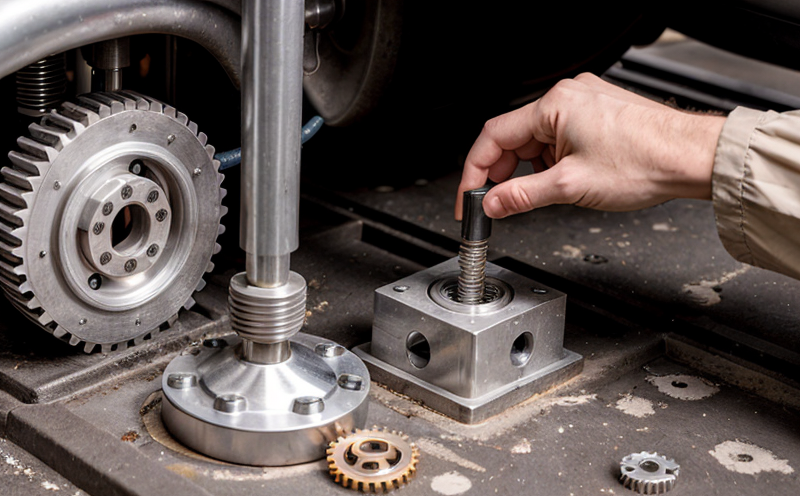ASTM D1525 Vicat Softening Temperature Testing
The ASTM D1525 Vicat softening temperature (VST) test is a critical method used in additive manufacturing and 3D printing to evaluate the thermal stability of thermoplastic materials. This test measures the point at which a material begins to soften under heat, providing valuable insights into its potential for use in various applications requiring elevated temperatures.
The Vicat softening temperature is particularly important for additive manufacturing processes where materials are subjected to high temperatures during printing and post-processing steps. Understanding this property helps ensure that parts will not deform or fail due to thermal stress, especially in aerospace, automotive, and medical industries where reliability under heat is paramount.
The test involves placing a standard steel needle into a sample of the material being tested until it begins to sink by a specific distance (1mm). The temperature at which this occurs is recorded as the Vicat softening point. This simple yet precise method provides an accurate measure of how a material behaves under heat stress, making it essential for quality assurance in additive manufacturing processes.
The ASTM D1525 standard specifies detailed procedures to ensure consistent and reliable results across different laboratories. Compliance with these standards ensures that the data generated from the test is both reproducible and comparable internationally. For instance, ISO 9001:2015 quality management systems help ensure that our testing processes meet stringent requirements for accuracy and consistency.
Incorporating ASTM D1525 into your quality control strategy allows you to make informed decisions about material selection and process optimization. By identifying materials with appropriate Vicat softening temperatures, manufacturers can enhance the durability and performance of their products without compromising on cost or environmental impact. This test also plays a crucial role in regulatory compliance, ensuring that your products meet safety standards relevant to their intended use.
Understanding how different variables such as temperature, pressure, and time affect the Vicat softening behavior of materials is vital for optimizing additive manufacturing processes. For example, by conducting this test under controlled conditions, engineers can determine optimal print settings that minimize warping or distortion without sacrificing part integrity. This knowledge translates directly into more efficient production lines and higher-quality end products.
Eurolab Advantages
At Eurolab, our expertise in ASTM D1525 Vicat softening temperature testing sets us apart from other laboratories. With state-of-the-art equipment calibrated to meet international standards like ISO 9001:2015 and ISO/IEC 17025:2017, we ensure that every test conducted is precise and reliable.
- Advanced Instruments: Our laboratories are equipped with top-tier testing machines capable of replicating real-world conditions accurately. These instruments provide consistent results regardless of the material or application.
- Trained Technicians: Our team comprises highly qualified professionals who have extensive experience in additive manufacturing and 3D printing testing. They stay updated on the latest developments in the field to deliver accurate interpretations and actionable insights.
- Rapid Turnaround Times: We understand that time is of the essence, especially for busy R&D departments and quality assurance teams. Our streamlined processes allow us to complete tests efficiently while maintaining high standards of accuracy.
- Comprehensive Reporting: Beyond just providing numerical results, we offer detailed reports that include all relevant information necessary for decision-making. These reports are tailored to meet the specific needs of our clients, whether they require compliance documentation or in-depth analysis.
The combination of cutting-edge technology, experienced personnel, and a commitment to excellence makes Eurolab your trusted partner for ASTM D1525 Vicat softening temperature testing. Whether you're looking to enhance product quality or comply with regulatory requirements, our services are designed to support your goals effectively.
Customer Impact and Satisfaction
EuroLab’s comprehensive approach to ASTM D1525 Vicat softening temperature testing has significantly impacted the operations of many leading companies in the additive manufacturing sector. By providing accurate, reliable data through our state-of-the-art facilities and experienced staff, we help these organizations improve their product designs and manufacturing processes.
One key impact is enhanced material selection. With detailed insights into how different materials perform under heat stress, manufacturers can choose more suitable options for specific applications. This not only improves the overall quality of products but also reduces risks associated with improper material use.
R&D teams benefit greatly from EuroLab’s testing services as well. The ability to test new materials or innovative techniques in a controlled environment allows them to innovate confidently, knowing they have access to robust data supporting their experiments. This leads to faster development cycles and more successful product launches.
For procurement departments, having reliable information about the thermal properties of various materials ensures better sourcing decisions. It helps avoid potential issues down the line by selecting suppliers who provide high-quality products consistently meeting specified standards.
Customer satisfaction is at the core of what we do at EuroLab. Our focus on accuracy, efficiency, and personalized service has earned us a reputation for excellence within the industry. Many of our clients return to us time after time because they trust in the quality of our work and appreciate the value it brings to their businesses.
Environmental and Sustainability Contributions
The ASTM D1525 Vicat softening temperature test plays a crucial role in promoting sustainability within additive manufacturing by helping companies choose materials that are more durable and resistant to heat. By ensuring that products can withstand higher temperatures without degrading, this test supports efforts towards reducing waste and extending product lifecycles.
- Reducing Waste: Materials with better thermal stability mean fewer instances of premature failure leading to less waste generated during production processes.
- Energy Efficiency: Parts that can operate at higher temperatures without needing frequent replacements contribute to overall energy savings throughout their lifecycle.
- Material Optimization: Understanding the exact temperature requirements allows manufacturers to optimize material usage, potentially reducing both raw material consumption and associated carbon footprints.
Moreover, by facilitating better material choices early in the design phase, ASTM D1525 helps reduce the need for extensive rework or redesign later stages of production. This proactive approach contributes positively towards achieving broader sustainability goals within industries reliant on advanced manufacturing technologies like 3D printing.





